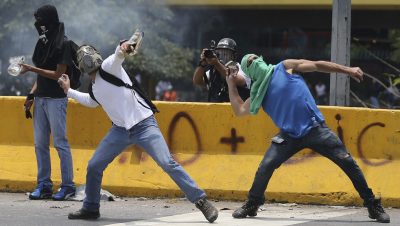Venezuela Calls for Expanding Armed Civilian Militias To Counter U.S.-Backed Opposition
Venezuela is continuing to endure violent protests from U.S.-funded right-wing opposition groups that seek to destabilize the country and remove its socialist leadership from power. But now, the country’s president is calling for expanding armed civilian militias to combat the groups’ threat.

As Venezuela gears up to face a massive protest from U.S.-funded, right-wing opposition groups, embattled President Nicolás Maduro has called for the expansion of armed civilian militias as the threat of more violence on the streets of Caracas continues to grow.
The militias, created by deceased former president Hugo Chávez to resist “imperialist aggression,” currently consist of about 100,000 members. Maduro’s proposed expansion of the civilian force would increase its size to 500,000. Maduro’s announcement was accompanied by a rousing speech in which he called upon Venezuelans to decide if they are “with the homeland” or against it, adding that “now is not the time to hesitate.”
The United Nations quickly condemned Maduro’s plan, arguing that it would only exacerbate tensions in the country. But the UN – along with other human rights organizations such as the Organization of American States – have refused to speak out against the violence perpetrated by the foreign-funded opposition.
The president’s plan to expand the civilian militias comes amid weeks of violent opposition-led protests in the nation’s capital that have seen the deaths of several protestors, with the planned “mother of all protests” set to take place this Wednesday. The ruling United Socialist Party of Venezuela has also planned a counter-protest for the same day, meaning that clashes between the two groups are almost certain to occur.
The violence of the recent protests has captured international attention, as years of subtle and subversive foreign intervention against oil-rich Venezuela’s leftist government continues to take its toll. Former U.S. President Barack Obama alone dedicated $5 million to “support political competition-building efforts” in Venezuela. The U.S. is estimated to have spent between $50 to $60 million since Chávez’s election to bolster the country’s right-wing opposition. It should come as no surprise, then, that evidence has emerged showing right-wing politicians and their affiliates paying protesters in cash to violently escalate what would otherwise have been a largely peaceful opposition rally.
For instance, in one publicly released video, one of the protestors asserted that he was paid $420 to attack the Supreme Court building in Caracas with Molotov cocktails during an April 8 rally. Given that Venezuela’s economy is in tatters and many basic necessities are in short supply due to sanctions and other forms of economic warfare, offers of such large sums of money are likely hard to resist for many opposition members.
Venezuela’s opposition has repeatedly asserted that Maduro is transforming his presidency into a dictatorship while also blaming him for Venezuela’s economic problems, food shortages and rising crime. However, Maduro and his supporters continue to assert that opposition leaders, bolstered by foreign governments and corporations, are fomenting violence and waging an economic war intended to destabilize his regime in order to return political power to the right wing, which ruled the country prior to Chávez’s rise to power.
There has been considerable evidence to support Maduro’s claims, though much of it has not been widely reported by the international media. For instance, businesses associated with the opposition have been caught hoarding food and medicine to create the appearance of scarcity and shortages, a tactic long used by the U.S. against leftist Latin American regimes.
In addition, the Venezuelan opposition is openly funded by the United States and Venezuelan oligarchs who have expressed clear interest in regime change in Venezuela for years. While Maduro’s latest call for increased civilian involvement in protecting his government comes at a key time for the embattled president, it may not be enough to ward off the long-standing efforts to remove the socialists from power in Venezuela.

